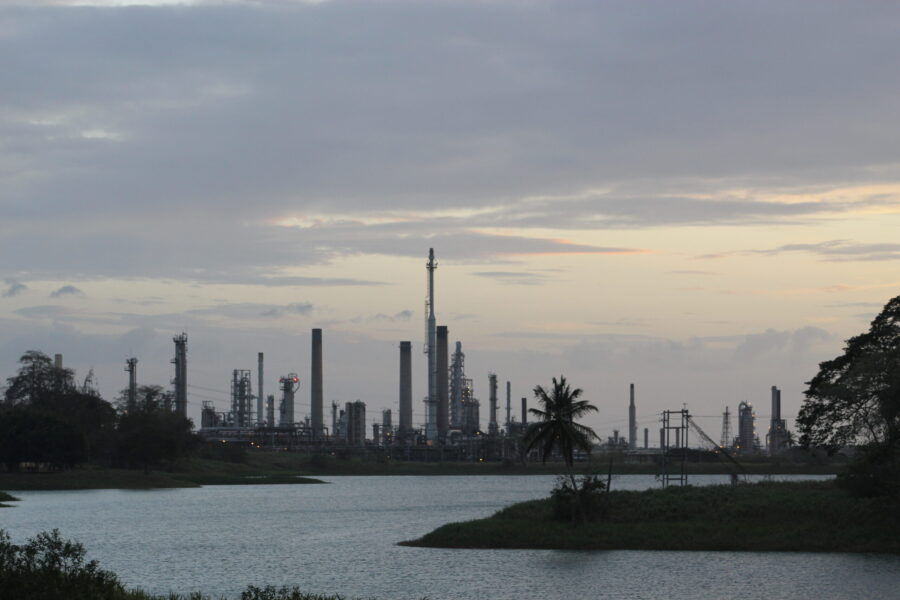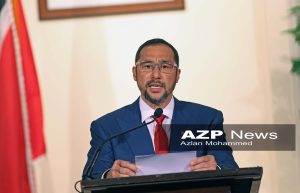‘… the T&T economy contracted by 17.3% with most of that pain being between 2015 to 2021’

KARL Marx got some things right and he got some things wrong.
One must however appreciate Marx was writing from the perspective of 19th-century Prussia (now Germany) and 19th century Britain to which he emigrated in 1849. Marx provided a two-tiered model of a society that had as its base the means of production and the relations of production.
That base supported a superstructure which includes the arts, religion, law, science, and education. Marx opined that the superstructure grew out of the base. In this regard, Marx opined that law was shaped by economics.
If therefore the base declines or decays, the superstructure falls.
In 2014, Trinidad and Tobago achieved its highest-ever real GDP of TT$187.1 billion. By 2021 that figure fell to TT$ 149.6 billion. These are official CSO figures lest I be accused of making them up.
‘T&T’s bureaucratic labyrinth or ‘Permit Raj’ does not help oil and gas production’
If we assumed a 2.5% growth rate for 2022 (using the IMF growth estimates) we arrive at a real GDP of TT$153.3 billion for 2022. This means that from 2014 to 2022, the T&T economy contracted by 17.3% with most of that pain being between 2015 to 2021.
The IMF expects 3.2% growth in 2023 predicated on a 2.9% growth in the energy sector. The latter will not be realised and therefore the IMF’s 2023 growth estimate is flawed. It should also be noted that economists use real GDP to describe the health of an economy and not nominal GDP as the latter is influenced by the vagaries of price. If for example, in 2022, the price of tomatoes went up to $100/ pound, agriculture’s contribution to nominal GDP would increase but this would reflect a price increase and not necessarily an increase in production.
‘As economics shapes law, so too does it shape politics’
The fall in real GDP is largely due to the fall in natural gas production. In 2022, natural gas production averaged around 2.7 billion cubic feet per day or 30% less than the 2015 figure. Research by Professor Roger Hosein shows a high correlation between natural gas production and the growth or contraction of our economy.
The fall in production was particularly precipitous in 2019 to 2021. There is some hope, as the Manatee project is expected to produce 700 million cubic feet of gas per day by 2027 or 2028. That project has not reached final investment decision (FID) but that could happen before the end of 2023.
The fundamental and far-reaching question for our country is what will happen to natural gas production in 2023 to 2027?
After all, since natural gas is the base that props up the superstructure, we should all be concerned. My forecast indicates that our natural gas production will struggle to nose back above 3.0 billion cubic feet per day until Manatee comes on stream in 2027 or 2028. In fact, it could well dip below 2.5 billion cubic feet per day (annual average) at some point before Manatee comes into production.
If you couple this with falling prices of ammonia and natural gas, it is pellucid that the country’s economy is in perilous waters.
Therefore, for the period 2023 to 2027, there is little reprieve for the T&T economy as the pressures created by low revenue collection will keep building. The Russia-Ukraine war provided a brief respite but that is now finished.
As economics shapes law, so too does it shape politics. A look at every major political turning point in T&T’s history since 1973 shows some relationship with events in the oil and gas industry.
The current PNM Government must therefore be contemplative of the economic condition of the country as the 2025 general election nears. They have placed a lot of effort on advancing the Dragon project with Venezuela, but no one can say when that natural gas will arrive in T&T.
The production of natural gas from the Columbus basin is now in its 51st year and that province is now in decline as evinced by the dramatic fall in BP’s production in the last three years.
The North Coast Marine Area (NCMA) is also past its prime. Knowing this, from 2011 to 2015, the Ministry of Energy aggressively licensed 1.2 million hectares of deepwater acreage. These efforts have resulted in the discovery of some 3.7 trillion cubic feet of natural gas resources to the northeast of Tobago. The issue here is the water depth and the distance from existing infrastructure both of which mean the cost of development is high.
The Ministry of Energy has, however, failed to license any deepwater acreage since 2014 (that is nine lost years). The country will pay a very heavy price for that inertia and inaction.
In fact, the ministry has licensed no new acreage since 2014. What they have done is renew existing licenses that expired. Given the long gestation to get projects off the ground (see Touchstone), if they were to award some new licenses for exploration in 2023, we will not realise production from that until the early part of the 2030’s.
T&T’s bureaucratic labyrinth or “Permit Raj” does not help oil and gas production. Once again, the economic base is being compromised.
T&T needs to be wary that global demand for oil and natural gas is expected to peak in the mid-2030s for oil and the late 2030’s for natural gas.
The energy transition is afoot, and it will bring great upheavals to the global economy. History repeats itself as the maxim goes. Cocoa and sugar fell prey to changes in international markets and the lack of competitive advantage at home.
Our oil industry is already heading to the graveyard not for a lack of oil but for the wrong business models and fiscal terms that suffocate it.
Natural gas will have a longer life than oil but will eventually go the same way.
Knowing all this, one would think the 2020’s would be a decade of transformation and building resilience but unfortunately, politicians are busy with politics. They cannot see far into the future and even if they did, they would not understand what they saw and would not know what to do.
T&T is in trouble not for a lack of natural resources, sunshine or deepwater harbours or optimal climatic conditions or intellectual capacity. What is missing is the leadership to meet the challenges that we have not begun to address.
The clock is ticking away.
Kevin Ramnarine is a former Minister of Energy of Trinidad and Tobago with 20 years of experience in the energy business. He holds degrees in Chemistry, Petroleum Engineering and Business Management.
![]()















Lennox Clarke
June 6, 2023Kevin since when Trinidadians vote on the strength of the economy. If so the strength of the economy was in a worst off state in 2015 than in 2010 under Manning but the UNC won 19 seats. We vote base on race not economic factors that is why the UNC can champion the rights of their financers in the Parliament and not the country’s interest. Ish, Steve and the man that was abducted on Barbados. Lol